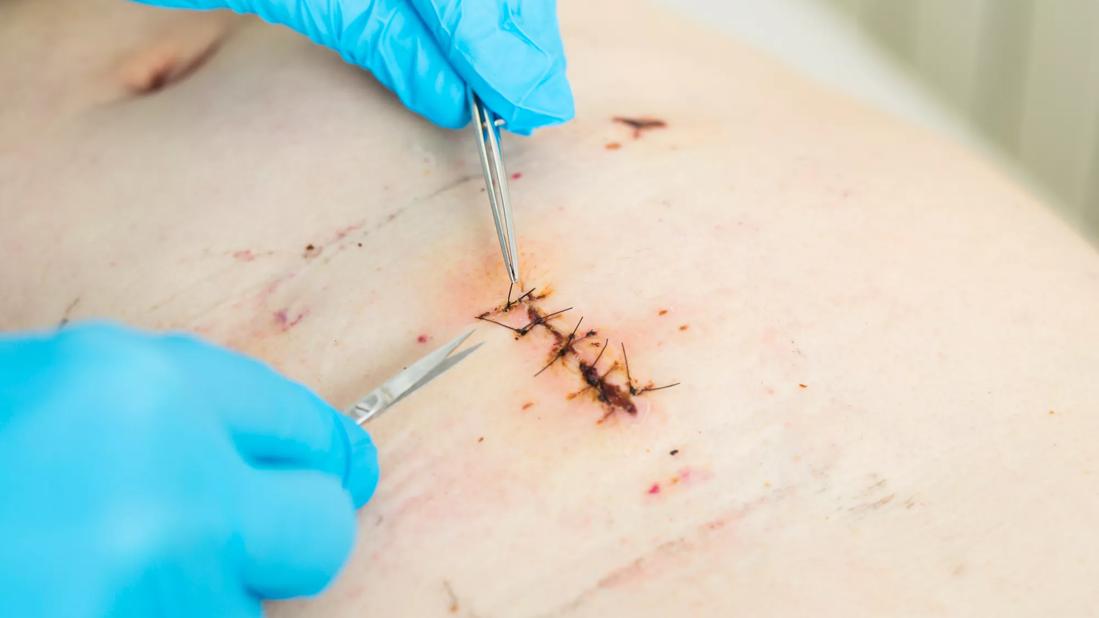5 ways to lower your infection risk

Image content: This image is available to view online.
View image online (https://assets.clevelandclinic.org/transform/af915213-b174-4ef2-a0d5-db6e016d8dca/HeartSurgeryWound_jpg)
How to Avoid Dangerous Infections After Your Heart Surgery
Infections of any surgical wound is serious business. After heart surgery, in particular, such an infection could be life-threatening. As surgical site infections (SSIs) account for 31 percent of all hospital-acquired infections, it’s critical to take steps to reduce your risk.
Advertisement
Cleveland Clinic is a non-profit academic medical center. Advertising on our site helps support our mission. We do not endorse non-Cleveland Clinic products or services. Policy
We want you to have a speedy recovery, but safety is our top priority. As a result, there are things your doctor will do to help decrease the risks of post-operative wound infections.
But there are also steps you can take to help yourself, especially if you are overweight or have diabetes.
An hour before surgery, your surgical team will give you a “prophylactic” or preventive antibiotic. In fact, you’ll receive antibiotics intravenously both before and after your surgery. With these steps, you’re less likely to get a wound infection.
In addition to getting antibiotics within one hour of your skin incision, you will also get another injection about 24 hours after your surgery. That’s the limit because overuse of antibiotics can lead to resistance. We find that three doses (one dose every eight hours) is sufficient.
During surgery prep, your surgical team will remove the hair on your body where the surgeon will make the skin incision.
Timing is important here. The team should take care to remove the hair right before the surgeon makes the skin incision. If they remove the hair too far in advance, you can develop infections in the small cuts that occur with any hair removal.
Recent studies show that clippers are generally safer than razors. (Razors increase the risk of surgical site infections.)
Advertisement
You have a greater risk of developing an infection if you are overweight. So we recommend before any elective surgery that you lose some weight if time allows. Some teams schedule surgeries weeks in advance. Take this time to eat healthier and focus on exercise.
If you have diabetes, you’ll want to get your blood sugar under control as much as possible.
In the weeks leading up to your surgery, monitor your blood sugars (up to four times per day), drink plenty of fluids and call your doctor if your blood sugars are consistently over 250. The better controlled your blood sugars are before surgery, the lower your risk of developing an infection.
Before the surgical team discharges you from the hospital, they will teach you how to care for your wound. That’s critical in preventing a wound infection. You’ll receive discharge instructions, so be sure you understand them and ask questions if you don’t.
Whether you have large incisions in both your breast bone and your chest or a minimally invasive, smaller incision, carefully monitor all of your wound sites to watch out for infection. Make sure your hands are clean when you check your wounds.
Always follow your doctor’s instructions for bathing and showering, and never hesitate to call your doctor with any questions.
Contributor: Nicholas Smedira, MD
Advertisement

Sign up for our Health Essentials emails for expert guidance on nutrition, fitness, sleep, skin care and more.
Learn more about our editorial process.
Advertisement
It’s important to remember that not everyone heals at the same rate
Making healthy lifestyle changes ahead of surgery can help you avoid AFib after
Three alternatives to open-heart surgery
Understand what’s going to happen before and after surgery
Most recommended precautions center around minimizing bruising or swelling
Even one drink can have an impact on your cognitive function leading to slurred speech, blurred vision and impaired memory
Type 2 diabetes isn’t inevitable with these dietary changes
Applying a hot or cold compress can help with pain
Pump up your iron intake with foods like tuna, tofu and turkey